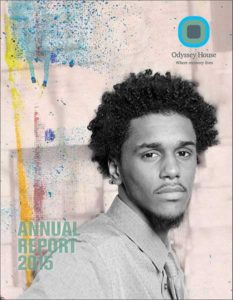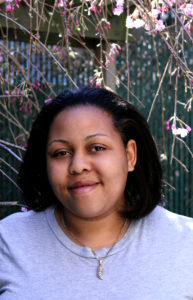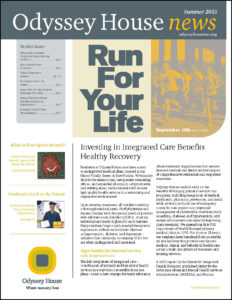BEHAVIORAL HEALTH NEWS
By Peter Provet, PhD President & CEO Odyssey House
The term “behavioral health” is often used to describe the connection between behavior and the health and well-being of the body, mind, and spirit. Substance use disorders, mental illness, homelessness – these are all behavioral health problems that need a multi-faceted treatment approach. The path to recovery requires us to see the connection between substance abuse and related problems and to take the necessary steps to address these issues in a comprehensive and effective way. That is why Odyssey House provides high quality, holistic treatment impacting all major life spheres: psychological, physical, social, family, educational, and spiritual.
Established in 1967, Odyssey House is a nonprofit behavioral health care organization with a mission to provide comprehensive and innovative services to New Yorkers struggling with substance use disorders, mental illness, and homelessness. With 10 substance abuse, mental health and supportive housing facilities located in East Harlem and the South Bronx, Odyssey House provides a range of direct and supportive services, including residential and outpatient substance abuse treatment, trauma-informed services, case management, primary health care, dental care, mental health care, supportive housing, recovery coaching, housing assistance, vocational and educational support, and more.
Treating the Whole Person
At any one time, Odyssey House is home to more than 1,000 men, women, and children. Some of these residents are young mothers who enter treatment with their children, seeking a drug-free life for themselves and a brighter future for their families. Older men and women come into treatment to break a lifetime habit of addiction, while teens are attempting to get back on track and succeed in school and at careers. For all of these clients, Odyssey House provides a chance to recover from addiction and mental illness and, along with that, to experience the psychological and physical well-being that comes with recovery.
Throughout all programs, Odyssey House provides holistic care with wraparound services. Recognizing that there is no “one size fits all” treatment model, Odyssey House does not simply place clients in housing or treat them for their substance use disorders or mental illness. We provide ongoing, personalized support to teach daily life skills, reunite families through NYC Administration for Children’s Services mediation and family therapy, attend to educational needs through GED preparation and classes, and care for the body through our health clinics and on-site gym facilities.
This complete continuum of care stabilizes clients and puts them on the path to lasting independence. Through Odyssey House’s licensed medical clinic and dental clinic, clients of all programs are able to access a range of health care services, giving our clients a crucial opportunity to manage their health before their conditions degenerate into an emergency situation.
Managing Mental Illness
Men and women suffering from mental illness are especially prone to substance abuse. The effects of addiction combined with the challenges of chronic mental conditions can be devastating, isolating these men and women from family, making it almost impossible for them to lead productive lives in the community, and often rendering them homeless.
At Odyssey House, case managers and counselors enhance treatment in our supportive housing communities with intensive mental health services and coaching in life skills ranging from personal hygiene to financial management. Up to 250 residents, most referred from city and state psychiatric facilities, partake in supported community living plus group therapy, medication management, vocational counseling and job training—all part of preparing themselves to take control of their lives and re-enter the community.
When the time comes, Odyssey House helps these men and women make the difficult transition into permanent housing. Residents in treatment attend workshops that teach such real-life skills as budgeting, making rent payments on time, and grocery shopping. Once participants have successfully completed the workshops, a placement specialist helps them find affordable housing, accompanies them on interviews with landlords, and helps negotiate rental contracts. In this way, Odyssey House helps break the cycle of relapse and homelessness.
Beyond Treatment
At Odyssey House, recovery is more than just sobriety. Recovery includes engaging in regular physical activity, taking responsibility for your health, and expressing yourself creatively.
Research shows that exercise not only improves cardiovascular function and has other physical benefits but can also elevate mood, alleviate stress, and even improve brain function. Exercise makes us feel better, both mentally and physically, and that is why physical fitness is such a big part of the Odyssey House experience.
Facilities are equipped with exercise equipment and weights, and residents are encouraged to enjoy yoga, Pilates, basketball and other team sports. Especially popular is Run for Your Life, a program that brings residents of all ages together several times a week in New York’s Central Park to walk or run. Many clients also choose to participate in marathons and other races.
Creating art provides a way to access and express feelings, and helps relieve a sense of isolation. Residents at all Odyssey House facilities are encouraged to express themselves through art and writing, and also enjoy readings, film screenings, and museum visits. The Odyssey House Art Project engages residents in painting, sculpture, and other forms of expression. Every year, works by these residents are showcased in the Haven Art Gallery, occupying a handsome, lightfilled space in an Odyssey House facility on East 121st Street in Manhattan.
These activities provide residents with a chance to develop relationships with one another, improve their self esteem, gain control over their bodies, and get a change of pace from the strenuous, day-to-day routine of recovery. Most important of all, they introduce residents to yet another component of a richer, fuller, more satisfying substance-free life.




 Ashley, 28, started using drugs and alcohol after graduating high school in Long Island. It started with the occasional use of marijuana and alcohol, mostly as a means of fitting in with her friends and dealing with low self-esteem. It also made it easier to ignore that she was directionless, in and out of college, unable to decide what to study or do with her life.
Ashley, 28, started using drugs and alcohol after graduating high school in Long Island. It started with the occasional use of marijuana and alcohol, mostly as a means of fitting in with her friends and dealing with low self-esteem. It also made it easier to ignore that she was directionless, in and out of college, unable to decide what to study or do with her life.